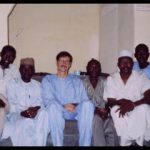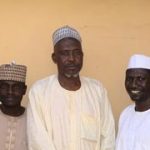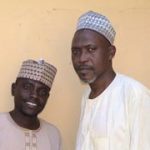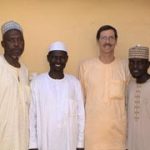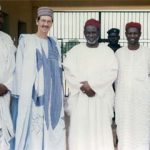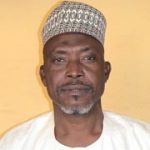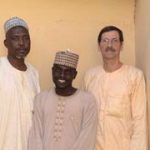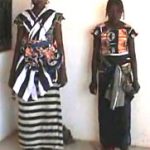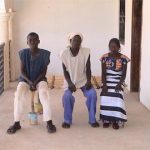Ngizim
Ngizim is spoken in Yobe State, Nigeria, in the area to the east and south of Potiskum, the largest city in Yobe State, as well as in Potiskum, which was originally an Ngizim town. It is one of seven languages of the Chadic family indigenous to Yobe State, the others being Bade, Bole, Duwai, Karekare, Maka, and Ngamo. Ngizim is a member of the West Branch of Chadic and is hence related to Hausa, the dominant language throughout northern Nigeria. Ngizim’s closest linguistic relatives are, however, Bade, spoken north of Potiskum in Bade (Bedde) Emirate, whose capital is Gashua, and Duwai, spoken east and south of Gashua.
The Ethnologue gives a 1993 population figure of 80,000 for Ngizim speakers, which seems not unreasonable. The pre-eminent traditional ruler of the Ngizim people is Mai Potiskum, HRH Alhaji Umaru Bubaram, whose court is located in Yarimaram, near Potiskum. Like all the traditional rulers of northern Nigeria, Mai Potiskum is the prime Islamic figure for the Ngizim people. Most Ngizims are Muslims, but a significant number are Christian, and there may be some who continue to adhere to the traditional religion.
Unlike some of the other languages in Yobe State, Ngizim has very little dialect variation. The Ngizim people pronounce the name as “Ng@z@m” (@ = a high central vowel, a “barred i” in the International Phonetic Alphabet). The origin of the name is uncertain. The same root is used in Bade to refer to various ethnic or regional variations of closely related languages, not just the people currently referred to as “Ngizim”. The table below shows the current autonyms for the people and language as well as the terms in Hausa and also in Kanuri, for many centuries the dominant linguistic and cultural force in northeastern Nigeria.
| NGIZIM | HAUSA | KANURI | |
| People | Ng@z@m (singular) Ng@zamcin (plural) |
Bangizme (m), Bangizmiya (f) Ngizimawa (pl) |
Ng@z@m |
| Language | miya Ng@z@m ‘mouth/language [of] Ngizim’ |
Ngizimanci | Ng@z@m |
Research on Ngizim
Most previous published work on Ngizim, including a Dictionary of Ngizim published in 1981, derives from research done by Russell Schuh in 1969-70, when he was a Research Assistant on a comparative Chadic project (funded by the US National Science Foundation, grant #2279, Paul Newman, Principal Investigator). Schuh also worked on Ngizim for brief periods in the 1970’s and 1980’s, but the main new initiative to make documentation in and on Ngizim available to the Ngizim people and a larger public is the Yobe Languages Research Project. This project has been supported by two awards from the US National Science Foundation. The first, “The Chadic Languages of Yobe State, Nigeria” (award #BCS-0111289, Russell G. Schuh, Principal Investigator), ran from 2001-2004. The second, “Lexicon, Linguistic Structure, and Verbal Arts in Chadic Languages of Northeastern Nigeria” (award #BCS-0553222, Russell G. Schuh, Principal Investigator), runs from 2006-2009. Directors of the project under both grants are Russell G. Schuh, the Principal Investigator, and Alhaji Maina Gimba, the In-Country Director. Members of the Ngizim team during the first funding period were Muhammad Adamu, Ahmed M. Baidu, Joseph Ya’u Yakubu, and Usman Garba Potiskum. For the the second funding period, the Ngizim team has been Muhammad Adamu and Usman Babayo Garba Potiskum. Thanks go also to HRH Alhaji Umaru Bubaram, Mai Potiskum for his support and to Madu Liman and his family for indispensable logistic support.
The Ngizim Research Team, 2001-2004
- L to R: Alhaji Maina Gimba, Muhammad Adamu, Russell Schuh, Joseph Ya’u, Usman Garba, Ahmed Baidu
- Muhammad Adamu, 2009
- Muhammad, Usman, 2009
- Usman, Gimba, Schuh, Muhammad 2009
- Usman, Schuh, HRH Alhaji Umar Bubaram, Gimba, Muhammad 2008
- Usman Babayo Garba, 2009
- Usman, Muhammad, Schuh 2009
Ngizim Tales and Other Texts
 |
Duvu Muya
|
 |
Traditional Marriage and Birth CustomsThese are texts from Al’adun Aure da Haihuwa a Al’ummun Yobe [Hausa: Customs of Marriage and Birth among Yobe Peoples], a collection published in Potiskum in 2002 by the Yobe Languages Research Project. The collection comprises descriptions of marriage and birth practices among five Yobe groups: Bade, Bole, Karekare, Ngamo, and Ngizim. Click on the links below for the Ngizim texts with line by line English translation, a movie of a wedding song, and pictures of events in a traditional Ngizim marriage. |
Zebak Ngizim [Ngizim Marriage]
Dadegerakem [It’s Your Limit] wedding song
D’iyi na Ngemuri Dlegun i Adak Ngizim [Birth and Celebration of a Naming in Ngizim Custom]
- New bride with her “helper” (a young girl who will stay with her to help her out for several days after she moves to her husband’s house). Note the multiple cloths wrapped at the bride’s waist and the black and white striped traditional wrapper. Reinactment taken January 9, 2009 at the Mai Pataskum Museum, Usman Babayo Garba, Curator.
- Procession of women carrying damba calabashes to a new bride’s home. Note the white cord linking the calabashes. Clip from video taken in Degubi, January 31, 2009. This is actually a Karekare town, but the customs for the wedding procession are the same as for the Ngizims.
- Three damba calabashes carried in wedding procession. Picture taken January 2, 2009 at Mai Pataskum Museum, Usman Babayo Garba, Curator.
- Groom, his friend, and his “ambassador” sitting on a cornstalk bed to greet visitors after bride has been taken to her new home. Note blue shirt worn by groom and white shirt worn by friend. Reinactment taken January 9, 2009 at Mai Pataskum Museum, Usman Babayo Garba, Curator.
 |
NGIZIM TALES BY ADAMU SALEZenzen da Rik Adamu Helman Sale [Tales by Adamu Helman Sale] is a collection of ten traditional tales written by Adamu Saleh from Garin Saleh, a village near Potiskum. Malam Adamu wrote these tales in 1969-1970 while working with Russell Schuh, who was at the time a Research Assistant on a comparative Chadic project (funded by the US National Science Foundation, grant #2279, Paul Newman, Principal Investigator). These tales remained unpublished until the present volume of text appeared. This collection was published in 2003 by the Yobe Languages Research Project, printed by Ajami Press, Potiskum. The tales can be downloaded in pdf format by clicking on the links below. The files are formatted line by line with Ngizim side by side with rough English translations. |
Bedlamu na Ja [The Hyena and the Dog]: The hyena and the dog live together, with a mutually agreed arrangement that the dog care for the children and the hyena go hunting for food. The dog and her children eat the hyena’s children while she is gone, setting a series of events in motion.
Bedlamu na Kayak [The Hyena and the Squirrel]: The squirrel and the hyena decide to visit the king, but the squirrel gives the hyena some bad advice about a gift, setting a series of events in motion.
Gayim na Gaskam [The Cat and the Rooster]: The cat and the rooster are friends, but the cat is afraid of the rooster, fearing that he will be burned by the “hot coals” on his friend’s head. Once he discovers his mistake, the trouble starts!
D’ayak [A Goat]: A goat, on reaching the age to get married, asks the father of his friend, the ram, to make him a charm so girls will like him. The ram’s father gives him some advice, which he rejects, and his adventures start.
Gomak [A Ram]: A ram makes his living by traveling to far off lands for trading. He amasses considerable wealth and marries several wives. Things are going fine until he decides to marry a hyena, against the advice of his friends.
Benderkuku [Bundurkuku]: Bundurkuku was a giant and a great hunter specializing in elephants. One day, a hyena comes and is trying to eat part of his house, which is constructed with bones and other remains of his hunting exploits. Bundurkuku takes the hyena on as a hunting protege. After a few years, Bundurkuku dies, and the hyena tries to emulate the exploits of Bundurkuku, with amusing results.
 |
NGIZIM VERBAL ARTSGamzazegai Gagaya Ngezem[Traditional Verbal Arts in Ngizim] is a collection of proverbs, riddles, tongue twisters, and song texts, published in 2004 by the Yobe Languages Research Project (printed by Ajami Press, Potiskum). Click on the links below to download Ngizim texts with English translations. |
Ruwa [Songs] (song texts are not yet ready for download)
 |
MORE TALES IN NGIZIMZenzen i Miya Ngezem [Tales in the Ngizim Language] is a collection of tales by several storytellers, published in 2007 by the Yobe Languages Research Project (printed by Ajami Press, Potiskum). Click on the links to download line-by-line transcriptions of the tales with English translations. MP3 audio files are also available for tales 1, 2, 7, and 8. |
Told by Hasasna Musa D’ak Hard’o
- Bedlamu Na Veji [The Hyena and the Monkey]
- Mamu Kwan [Three Children]
Told by Bukar Inuwa Ngwajin
- Nen D’agai Na Wenyageri [A Man and His Daughter]
- Ama Dagai Na Gwaigwai [A Woman and a Spirit]
Told by Muhammad Alhaji Adamu
- Bedlamu Na Kwara [A Hyena and a Donkey]
- Nen Na Amatingeri Shirin [A Man and his Two Wives]
Told by Adama Sha’aibu Murba
- Wenya D’agai Na Migara [A Girl and Her Mother]
- Wenya D’agai Mi Ceked’ Gamsak [A Girl Who Selected (from among) Men]
 |
Ruwa Miya NgizimRuwa Miya Ngizim [Songs in the Ngizim Language] is a collection of women’s songs of several types: wedding songs, love songs, innuendo, the travails of childbirth, and funeral songs. In addition to being performed on the respective occasions, they are sung at public gatherings and during work, such as grinding. Click here or on the image to download the text with English translations. |
The songs in the text are ordered more or less in “life order”. For an outsider, the content seems extremely allusive, disconnected, and hard to understand. Each song is accompanied by a commentary that helps in understanding the theme and key lines.
The contents are as follows:
A Bai Bai [S/he Will Not Be Found] (a song about courtship)
Dadegerakem [It’s Your Limit] (a song for a new bride)
Aiwande De (a song about how a wife likes to be treated by her husband)
Ruwak Ad’a Venyi [Song [Sung] on the Grindstone] (a song of praise and innuendo)
Tarewa (1) (two versions of a song in which a wife praises her husband for his faithfulness)
Tarewa (2)
Ayye Yari Naye (a song in which the bride of a forced marriage scorns her in-laws)
Yawai Mamale Yawai Dadale (1) (two versions of a song about the tribulation of childbirth and a lackadaisical husband)
Yawai Mamale Yawai Dadale (2)
Arayye Gezha (a song about poisoning the beer of a disliked person)
Arayye Gaja (the same basic song as the one just above, but this one about the practice of sorcery)
Dlab’a (1) (two versions of a song about a girl who is looking to become a fortune-teller)
Dlab’a (2)
Ai Bone Darari (1) [Oh The Suffering is Great] (two versions of a song about an unanticipated death)
Ai Bone Darari (2) [Oh The Suffering is Great]
Wa D’ana Miwa [Let Us Cry for our Mother] (a song about the death of an old person and how she will be remembered)
Wen Gama Aiwa (1) [Son of a Black Woman] (two versions of a song about a man who dresses nicely and looks good)
Wen Gama Aiwa (1) [Son of a Black Woman[
Aiye Karniga Jinga Karniga (a song about relationships between Ngizim clans)
(The refrain phrase, Aiye Karniga Jinga Karniga, sets the rhythm for a large variety of songs.)
 |
Unpublished Ngizim TextsThe texts listed below were collected at various times, but have never appeared in print anywhere. Some have recordings available on request. |
Kayak na Bedlamu na Temaku [The Squirrel, the Hyena, and the Sheep], Tambai Barema: A tale narrated in 1970 in Potiskum. The squirrel misleads the sheep and the hyena to set up lodging together. (Recording available.)
Devek Barakau [The Way Barakau (is performed)]: Barakau was the most important pre-Islamic Ngizim ritual, done annually during the planting season. This text describing the ritual is accompanied by a movie showing still pictures taken in Yandiski, a village near Potiskum, in August 1970. The movie includes recordings of invocations made as part of the ritual.
In Winter Quarter 2002, Prof. Russell G. Schuh gave a graduate proseminar at UCLA on the phonology and morphology of the Bade and Ngizim languages, base on data collected prior to the Yobe Languages Research Project. As part of this project Russell G. Schuh prepared extensive descriptive handouts that and posted on a course website as pdf files. In addition to descriptions of phonology and morphology, there is a bibliography and a couple of papers on historical phonology. Click here to see the course website and links to handouts and papers.


